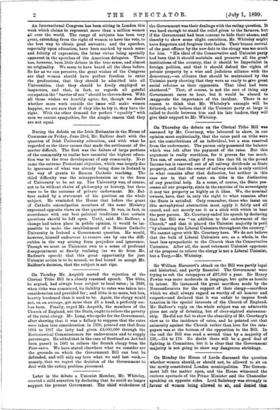Later in the debate a Unionist Member, Mr. Whiteley, created
a mild sensation by declaring that he could no longer support the present Government. The chief wickedness of
the Government was their dealings with the rating question. It was hard enough to stand the relief given to the farmers, but if the Government had been content to hide their shame, and thereby to show some slight contrition, Mr. Whiteley might have forgotten and forgiven their faults. Their brazen revival of the past offence by the new dole to the clergy was too much for him. "His ideal of the Conservative and Unionist party had been that it should maintain and preserve all the great institutions of the country, that it should be Imperialist in foreign polities, and that it should defend the rights of private property by a wise and judicious alliance with the democracy,—an alliance that should be maintained by the Unionist party showing that they were as ready to give great social reforms as their opponents. That ideal had been shattered." That, of course, is not the sort of thing any Government cares to hear, but it would be absurd to araggerate the importance of the incident. There is no reason to think that Mr. Whiteley's example will be followed, or to believe that if the Unionist party at large is called to decide between him and his late leaders, they will give their support to Mr. Whiteley.















































 Previous page
Previous page